
Neu bei RuneScape? Dieser Leitfaden behandelt alles, was Sie über die Grundlagen des Spiels wissen müssen, was Sie nach dem Tutorial als Nächstes tun müssen und wo Sie bei Bedarf weitere Hilfe finden können.
Die Grundlagen
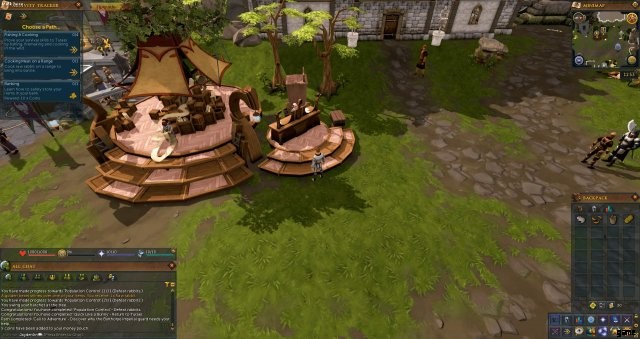
Bewegung ist in RuneScape einfach – klicken Sie einfach auf die Stelle, an der Sie sich bewegen möchten, und Ihr Charakter rennt (oder geht) dorthin. Wenn es einen NPC gibt, mit dem Sie sprechen möchten, klicken Sie einfach auf ihn, um zu interagieren. Dasselbe gilt für die Interaktion mit einem Objekt wie einem Baum oder um einen Kampf mit einem Monster wie einem Kobold zu initiieren. Manchmal kann ein Objekt zusätzliche Interaktionsoptionen haben, einschließlich einer „Untersuchen“-Option, die Sie finden, indem Sie mit der rechten Maustaste darauf klicken.
Um Ihnen zu helfen, sich zurechtzufinden, können Sie die Minikarte oben rechts auf Ihrer Benutzeroberfläche verwenden. Die Minikarte zeigt die Umgebung deines Charakters, einschließlich nahegelegener NPCs (gelbe Punkte), anderer Spieler (weiße Punkte) und fallen gelassener Gegenstände (rote Punkte). Es gibt auch verschiedene Symbole, die auf der Minikarte erscheinen, um anzuzeigen, welche Merkmale in der Nähe sind, sei es eine Bank, ein Ofen oder ein Angelplatz, und wenn Sie etwas sehen, auf das Sie Ihren Charakter zubewegen möchten, können Sie dies tun indem Sie einfach auf die Minikarte selbst klicken.
Wenn Sie in ein neues Gebiet reisen, stoßen Sie möglicherweise auf einen Magneten auf dem Boden. Du kannst auf den Magneten klicken, um ihn zu aktivieren, wodurch du dich frei zurück in das Gebiet teleportieren kannst, indem du das Magneten-Netzwerk verwendest, indem du auf das „H“-Symbol neben deiner Minikarte klickst.
Wenn Sie sich durch Städte und Gemeinden wagen, werden Sie auf andere Spieler stoßen, die auf ihren eigenen Abenteuern sind. Warum sagst du nicht Hallo? Der In-Game-Chat befindet sich unten links auf Ihrer Benutzeroberfläche und von dort aus können Sie alle Nachrichten sehen, die von anderen Spielern gesendet wurden, in deren Nähe Sie waren. Sie können Ihre eigenen Nachrichten senden, die für die Spieler in Ihrer Umgebung sichtbar sind, indem Sie die Eingabetaste auf Ihrer Tastatur drücken, und sobald Sie sich mit jemandem angefreundet haben, können Sie ihn zu Ihrer Freundesliste hinzufügen, indem Sie mit der rechten Maustaste auf eine seiner Chat-Nachrichten klicken und auf „Hinzufügen“ klicken Freund“.
Anfang
Nachdem Sie Ihren Charakter erstellt und das Tutorial abgeschlossen haben, werden Sie direkt in die Welt von Gielinor an einem Ort namens Burthorpe geworfen. Gielinor kann anfangs überwältigend sein, aber es ist für jeden etwas dabei.
Wenn Sie eine gute Geschichte lieben, können Sie die reiche Geschichte der Welt und der sechs Zeitalter durch einige Quests erkunden. Wenn Sie gerne hacken und schlitzen, gibt es in der Nähe einige Kaninchen und Kühe, die für ihre Gegenstände getötet werden können. Wenn Sie bereit sind, einige Fähigkeiten zu schleifen, gibt es einige Bäume und Angelplätze, mit denen Sie interagieren können. Oder, wenn Sie einfach nur gerne erkunden, können Sie sich von Burthorpe aus in Richtung der Stadt Falador wagen.
Quests
Reden wir über Quests. Quests helfen dir, die Geschichte von Gielinor zu verstehen, und einige gewähren dir Zugang zu manchmal einzigartigen und mächtigen Belohnungen, wie bestimmten Arten von Waffen und Rüstungen oder sogar brandneuen Gebieten. Die meisten Quests belohnen Erfahrung für das Abschließen, daher kann dies ein guter Ausgangspunkt sein, um Ihre Fähigkeiten zu verbessern.
Sie können Quests auf der Karte finden, indem Sie nach einem Symbol suchen, das wie ein blauer Stern in einem Kompass aussieht. Indem Sie den Mauszeiger auf der Weltkarte darüber bewegen, können Sie sehen, welche Voraussetzungen für den Start erforderlich sind. Sie können auch eine Liste aller Quests öffnen, indem Sie auf das Quest-Symbol in der Haupt-Ribbon-Oberfläche in der unteren rechten Ecke Ihres Bildschirms klicken.
Alle Quests im Spiel sind nach Schwierigkeit und Länge aufgeteilt, und einige finden sogar chronologisch vor anderen statt. Es gibt viele verschiedene Quest-Handlungsstränge, die Sie erleben können, egal ob Sie es mit Vampiren in Morytania zu tun haben oder eine mysteriöse Seuche in Ardougne untersuchen.
Hier sind einige Quests, die großartig sind, wenn du gerade erst mit RuneScape anfängst:
- Wolf Whistle – Reise ein kurzes Stück nach Taverly und hilf einer Gruppe von Druiden, indem du eine Einführung in die Beschwörungsfertigkeit erhältst.
- Der Blutpakt – Bekämpfe einige Monster in den Katakomben von Lumbridge und erfahre mehr über den Kampf in RuneScape.
- Cook’s Assistant – Dies ist eine klassische RuneScape-Quest, bei der Sie Zutaten für den Koch von Schloss Lumbridge sammeln. Kurz und bündig, die Belohnungen helfen dir bei deinen Kochkünsten.
- Gertrudes Katze – Hilf Gertrude, ihre verlorene Katze Fluffs zu finden. Holen Sie sich im Gegenzug einen pelzigen kleinen Freund, der Sie begleitet.
- Eine durchdringende Anmerkung – Die Nonnen der Abtei von Saint Elspeth brauchen deine Hilfe, um ein Rätsel zu lösen.
- Ein Schatten über Ashdale – Erkunde die wunderschöne Insel Ashdale und werde mit etwas Erfahrung belohnt, um deine Kampffähigkeiten zu verbessern.
- Was mir gehört, gehört dir – Erfahre mehr über die Bergbau- und Schmiedefertigkeiten, während du einem Zwerg namens Doric hilfst.
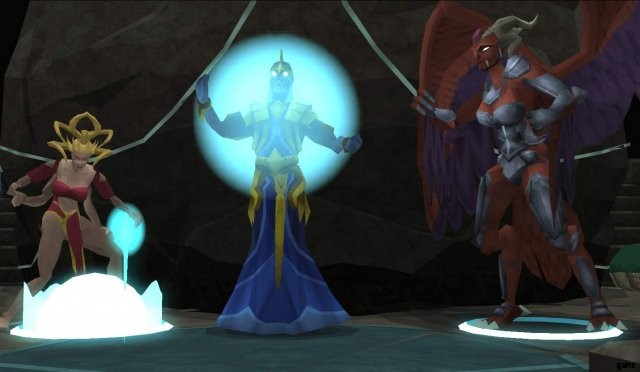
Schließlich wirst du ein bekannter Abenteurer in Gielinor, und mit fortschreitenden Fähigkeiten kannst du einige Quests mit riesigen Belohnungen annehmen. Hier sind die wichtigsten Quests, die du während des Spiels abschließen musst, von denen einige eine RuneScape-Mitgliedschaft erfordern:
- Drachentöter – Erschlage den mächtigen Drachen Elvarg, um die Fähigkeit zum Kauf von Runenplattenkörpern freizuschalten.
- Wüstenschatz – Entdecke verborgene Schätze in der Kharidian-Wüste, um das mächtige Zauberbuch der uralten Magie freizuschalten.
- Der Tempel von Senntisten – Restauriere einen alten Tempel unter der Ausgrabungsstätte, um Zugang zu einer neuen Reihe „verfluchter“ Gebete zu erhalten.
- Die Welt erwacht – Betritt einige Ruinen in der Nähe der Gilde der Legenden, um die Geschichte hinter dem Gott Guthix und ein Ereignis zu entdecken, das Gielinor für immer verändert.
- Das Ende der Seuche – Beende die Seuche von West-Ardougne und verschaffe dir Zugang zur Stadt Prifddinas.
Fähigkeiten
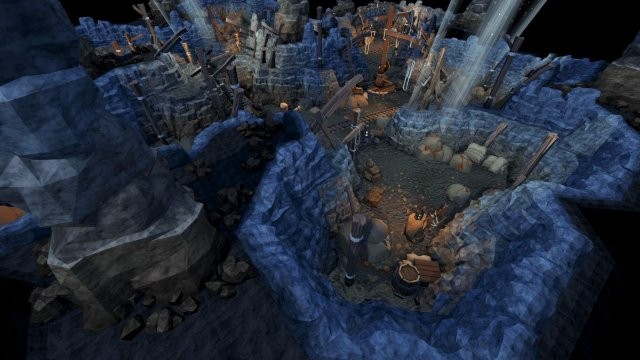
Fertigkeiten werden fast überall in RuneScape eingesetzt, und während Sie in der Spielwelt Fertigkeitsaktionen ausführen, sammeln Sie Erfahrung und schalten mehr Gegenstände frei. Sie sind die trainierbaren Fähigkeiten deiner Charaktere. Levelling certain skills, like Slayer, provide more places to explore, and more quests to do. Activities which train skills in RuneScape range anywhere from catching fish, to delving deep into the depths of dungeons.
During the tutorial, you learned about some of the basic skills in RuneScape – Fishing, Woodcutting, Firemaking, Cooking, Mining, and Smithing – but there are many more that you can level up. Free players have access to 17 skills, while being a member grants you access to all 28.
For players that are interested in combat, it will be important to not only consider improving your combat skills like Attack, Strength, and Defence, but also to improve “secondary” skills like Herblore and Summoning. These skills will help you in combat, as you can brew new potions to give you the edge over enemies, or summon familiars who can fight on your behalf.
Combat
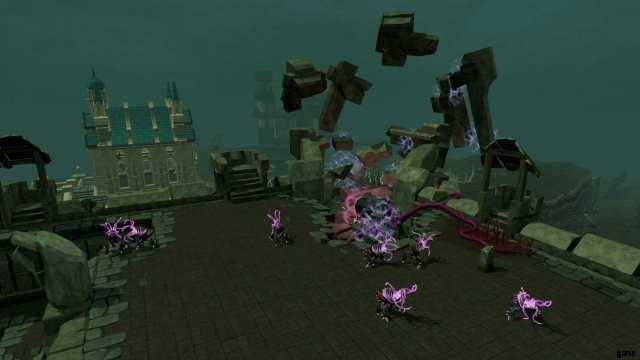
Like most fantasy worlds, Gielinor is inhabited by a variety of creatures:some of them friendly, many of them not. From dungeon rats to dragons, killing these monsters provide valuable experience in combat, and the ability to sell their loot for money. Monsters each have their own combat level, as indicated by the number shown above their head when you hover over them. These vary from easy level 1 rats, to super hard level 60+ dragons and bosses.
You also have your own combat level, which is a general indicator of how well your stats compare to the monsters you want to fight. Your combat level increases through training Attack, Defence, Strength, Prayer, Summoning, Magic, and Ranged skills – usually by killing monsters with the respective skill items. Levelling up your combat level unlocks more armour for you to wear, and weapons for you to use, which can help you kill stronger monsters.
When you first jump into the world after the tutorial is finished, your character will be quite weak, and only able to wield basic weapons and armour, such as bronze gear. By killing weaker monsters such as cows, goblins, and chickens, you can slowly increase your levels and gain the ability to wear even higher tier gear. Soon, you’ll be ruling the world with a dragon longsword, or even a weapon as mythical as a godsword.
The main combat system in RuneScape revolves around “action bars” and is called Revolution. When you attack a monster, your character will automatically cycle through abilities on your action bar to deal damage, apply bleeds, and stun it. All abilities have a cooldown, and generate adrenaline. Adrenaline allows you to use higher tier abilities, known as “threshold” and “ultimate” abilities. They usually deal an epic amount of damage compared to the basic abilities, and can even deal damage to multiple enemies in the area. You’ll have access to a number of action bars that you can switch between depending on the combat style that you’re using or the situation that you’re in.
Each action bar can have a number of abilities on them, which you can activate manually using hotkeys on your keyboard if you like, but if you have Revolution enabled, the game will automatically cycle through them (indicated by a yellow border around the slots on the action bar that will be cycled through).
Some monsters have certain weaknesses that mean that certain weapons are more effective against them. For example, you may find that attacking a hellhound with “slash” weapons will do more damage to them than shooting at them with a crossbow.
A good way to level up your combat skills is to train Slayer. By speaking to a Slayer Master, you can be assigned a task to kill a specific number of a type of monster, which will not only grant Slayer experience but also experience in whatever combat skills you’re using along the way. Maximum efficiency!
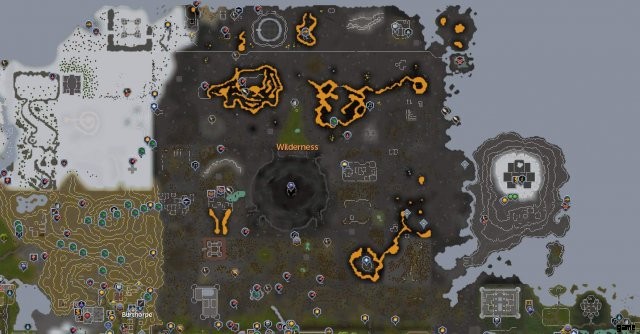
While travelling around Gielinor, be careful of an area called the Wilderness. The Wilderness is a dangerous PvP-enabled area on the north side of the world, where if you die, all of your items drop to the ground for any other players to freely take. Of course, there is no risk without reward, so be aware that some of the best training methods for skills in the game may require you to venture into this dangerous area.
Earning Gold
Money or gold pieces (GP) is the main currency in RuneScape and used for purchasing and selling items in the game, so you’ll need to accumulate a lot of it to progress through the game. You can primarily earn money from quest rewards, selling monster drops, or selling items made through training skills.
Some simple methods for making your first big bucks in RuneScape can be found over on our Money Making Guide, however here are some tips to keep in mind while playing:
When monsters drop coins on the ground, you can see a rough visual indication of how many coins are in the stack. If there’s only a few coins on the ground, it won’t be worthwhile further into playing the game. If there’s a bigger stack, then the monster could have dropped thousands of coins, and you should definitely pick them up. After you train up your Dungeoneering skill, you can use a Gold accumulator to pick up monster dropped coins for you.
You can sell items gained while training your skills – such as logs from Woodcutting, fish from Fishing, and ores from Mining. Sometimes, it’ll be useful to keep some of these items to allow you to train up other skills. For example, logs could be used for Fletching, or burned to raise your Firemaking level. Always weigh up the value of an item with how useful it is to your progression in the game. If you were chopping Oak logs and you can already fletch/burn Yew logs, it’s probably worth selling the Oak logs instead of keeping them.
Keep an eye on your bank. At every point through your experience with RuneScape, your bank will slowly become full of junk that you’re hoarding from previous quests, monster fights, or skilling. In bulk quantities, a lot of these items can become valuable and give you an extra boost.
The primary way of buying and selling items in-game is using the Grand Exchange (GE), which is located north-west of Varrock. By interacting with one of the booths at the GE, you can create buy or sell offers for specific items, and see their current price. The price of an item on the GE is a good indicator of how much the item is actually worth. When you list an item on the GE, as soon as a buyer tries to buy that item for your price (or higher), your transaction will complete and you can collect the coins from the GE, or at any bank by right-clicking a bank booth and clicking ‘Collect’. If you try to buy an item on the GE, you’ll buy it as cheap as possible – no higher than the price you entered.
Trading directly with other players in the game couldn’t be easier. You can right-click another player and click ‘Trade’ to start a trade with them if you find a worthy buyer, but always check to see what the current price of an item is on the Grand Exchange first to ensure you’re getting the correct payment.
Membership

RuneScape is a free-to-play game, and a lot of the content in the game can be accessed without paying for a membership subscription. However, if you’re enjoying the game, paying for membership will allow you to access even more skills, monsters to kill, and areas in the game for you to explore. You’ll also get access to members-only worlds, and complex stories in the form of quests.
Membership costs a fixed amount of real-world money a month and can be purchased directly through Steam or on the RuneScape website. If you prefer, you can pay for membership using in-game money too, which’ll be possible as you grind through the later levels in the game. This requires purchasing bonds, which you can find on the Grand Exchange.
Staying Safe
While the RuneScape community is full of pleasant and helpful people, you may come across some less pleasant players during your time in Gielinor. Always be on the lookout for anything that looks like a scam or may be a phishing attempt on your account.
If anyone asks you for personal information, such as your login or personal details, you should not give them this information. You may also see messages with URLs in the chat box – be cautious when visiting these websites if you do not recognise the links, as they could be dangerous.
Often, scams happen when other players advertise services, in which you have to trade them gold or items. If it sounds too good to be true, it probably is. For example, a common scam that has existed for as long as RuneScape has existed is that players will propose to “double” your money, by first trading them your coins. This is always a scam, and they will simply disappear with your money.
To help keep Gielinor safe, you might come across Player Moderators. These are normal players in the game that have a silver crown in the chat box to distinguish them from other players. These players have the ability to mute others in the chat, and report them directly to Jagex. Rarely, you might come across Jagex Moderators, which are represented with a gold crown in chat instead. These are actual Jagex employees, the developers who make the game. If anyone without one of these crowns tells you that they are a moderator or have the ability to mute/ban you, they aren’t telling the truth.
Another type of scam, known as luring, happens in the Wilderness. If someone asks you to enter the Wilderness holding something that you aren’t willing to lose, don’t listen to them! They are trying to kill you inside of a PvP area so that they can take your items.
You can report any player by right-clicking their message in the chat box and clicking ‘Report’.
What Next?
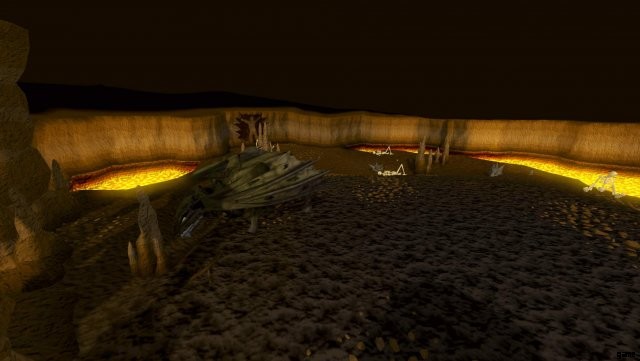
So, you’ve been playing RuneScape for a little while now. You’re levelling up your skills, exploring the world, making friends, and doing quests. But what should you work towards next?
If you’ve been enjoying quests, one of the hardest quests in free-to-play is Dragon Slayer. It involves navigating your way to the abandoned island of Crandor, where the dragon Elvarg awaits you. This will be a challenge, so make sure you have a good combat level, strong weapons, and sturdy armour before giving it a go.
Speaking of armour, what type of equipment are you currently using? Rune equipment, made of runite ore, is some of the strongest early game melee armour available. You can either make this yourself (with high enough Mining and Smithing levels), or purchase it with your hard earned gold.
If you’re more of a skiller, you can try working towards accessing Guilds – special buildings across the world, which can only be accessed once you have enough experience in their relevant skill. They can provide a good space for training up certain skills through mid levels, and you may find other people training the same skill there too that can help you out! A guild you can access early on is the Cooks’ Guild at level 32 Cooking. It has cooking ranges, a windmill, and water sources nearby for you to cook to your heart’s content.
To help progress your skills faster, there are a number of boosts that can help you. For example, wearing certain equipment can increase your levels in certain skills, allowing you to access higher level content before you’ve reached the required level. Some boosts can provide extra experience, such as portable skilling stations which can be placed down by other players for anyone to use and provide an increase to the experience you get while skilling with them.
If you’re a sucker for being a completionist, completing achievements are a great way to explore what RuneScape has to offer, level up, and get some unique rewards in return. The Lumbridge achievements are a good start to see what achievements are all about – they come in Beginner, Easy, Medium, and Hard difficulties, so there’ll be something you can do whatever level you’re at. See if you can complete them all!
Want to take a break from the traditional skilling and killing of RuneScape? You can check out the various minigames and Distractions &Diversions (D&Ds) dotted around the map. A lot of these provide experience in several skills, cool rewards, and allow you to have some fun with friends. Minigames can usually be accessed as often as you like, while D&Ds are accessible on a schedule. Early on in the game, you may find it useful to take part in the Tears of Guthix (members-only) and Giant Oyster D&Ds for a chance to get some experience and potentially valuable items.

Lastly, the Stronghold of Security is a great place to train your combat early on, learn about keeping your account secure, and get some nice rewards along the way. The Stronghold is full of monsters that get stronger the deeper you go – make sure you’re well prepared with food and strong equipment before you enter.
